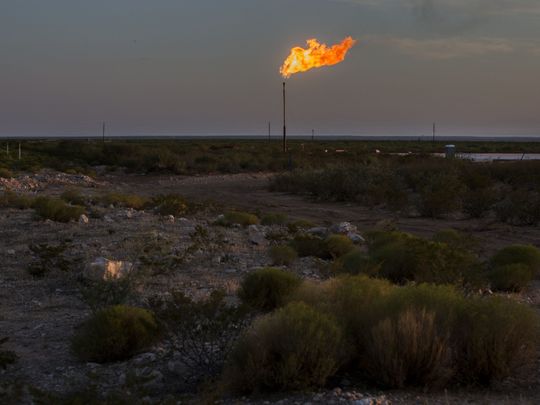
Abu Dhabi: Easing of US-Iran tensions that threatened to boil over have wiped out all of oil’s gains from last week, with markets back to where they were before the latest round of US-Iran escalation, analysts said.
Oil markets on Friday closed with Brent trading at $64.98 and West Texas Intermediate (WTI) on $59.04, with both recording their first weekly loss after five straight weeks of gains.
“The geopolitical spark that helped pushed Brent oil futures above $70 per barrel last week snuffed itself out quickly as it became apparent that an escalation of tension in the Middle East had no impact on oil market fundamentals or flows of physical crude,” said Edward Bell, commodity analyst at Emirates NBD.
“Brent futures fell more than 5 per cent last week to settle below $65 while WTI dropped nearly 6.4 per cent and closed at $59.04/b. The decline last week was the first weekly decline in the past six weeks and only the second weekly drop in the last 10,” he added.
“Market views from senior policymakers all tried to look through the recent escalation in tension to the underlying market fundamentals … Commentary from Opec’s secretary general [Mohammad Barkindo] and the UAE’s Energy Minister [Suhail Al Mazrouei] indicated they expected to see a relatively soft first half for 2020,” Bell said.
Ole Hanson, head of commodity strategy at Saxo Bank, said that Brent crude would likely settle between $62-$64 per barrel.
“Having surrendered half the October-to-January gains, crude oil is likely to settle into a range with Brent crude oil, given the risk of another flare-up, likely to find support between $64 and $62.
“Providing the geopolitical stage stays quiet, the short-term market direction is likely to be determined by the weekly US stock reports, economic leading indicators, US — China trade news and monthly oil market reports,” he added.
“Crude oil is currently being held down by rising non-Opec production led by the U.S and a potential disruption to supply could be mitigated by the release of strategic reserves held by the US, China, Saudi Arabia and IEA (International Energy Agency) member countries,” Hanson said.












